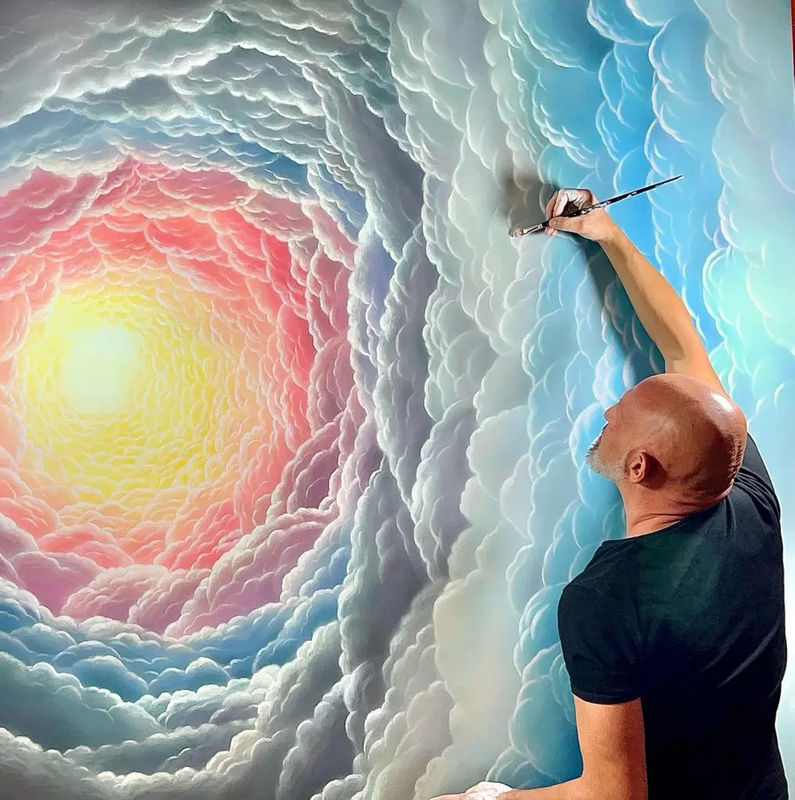Domenico Dell'Osso b. 1975
Works
-
 Domenico Dell'OssoL'inerzia dell'epoca contemporanea 49, 2024Acrylic on canvas25 x 30 cm
Domenico Dell'OssoL'inerzia dell'epoca contemporanea 49, 2024Acrylic on canvas25 x 30 cm -
 Domenico Dell'OssoBeyond - al di là, 2024Acrylic on canvas150 x 150 cm
Domenico Dell'OssoBeyond - al di là, 2024Acrylic on canvas150 x 150 cm -
 Domenico Dell'OssoPlayme, 2024Acrylic on canvas100 x 100 cm
Domenico Dell'OssoPlayme, 2024Acrylic on canvas100 x 100 cm -
 Domenico Dell'OssoThe society of fake people - La proiezione del falso sè, 2024Acrylic on canvas150 x 150 cm
Domenico Dell'OssoThe society of fake people - La proiezione del falso sè, 2024Acrylic on canvas150 x 150 cm -
 Domenico Dell'OssoWork in progress for president, 2024Acrylic on canvas100 x 100 cm
Domenico Dell'OssoWork in progress for president, 2024Acrylic on canvas100 x 100 cm -
 Domenico Dell'OssoChange, 2025Acrylic on canvas100 x 100 cm
Domenico Dell'OssoChange, 2025Acrylic on canvas100 x 100 cm -
 Domenico Dell'OssoReset!, 2025Acrylic on canvas150 x 150 cm
Domenico Dell'OssoReset!, 2025Acrylic on canvas150 x 150 cm -
 Domenico Dell'OssoL'inerzia dell'epoca contemporanea 17, 2024Acrylic on canvas25 x 30 cm
Domenico Dell'OssoL'inerzia dell'epoca contemporanea 17, 2024Acrylic on canvas25 x 30 cm -
 Domenico Dell'OssoL'inerzia dell'epoca contemporanea 16, 2024Acrylic on canvas25 x 30 cm
Domenico Dell'OssoL'inerzia dell'epoca contemporanea 16, 2024Acrylic on canvas25 x 30 cm -
 Domenico Dell'OssoL'inerzia dell'epoca contemporanea 23, 2024Acrylic on canvas25 x 30 cm
Domenico Dell'OssoL'inerzia dell'epoca contemporanea 23, 2024Acrylic on canvas25 x 30 cm -
 Domenico Dell'OssoL'inerzia dell'epoca contemporanea 18, 2024Acrylic on canvas25 x 30 cm
Domenico Dell'OssoL'inerzia dell'epoca contemporanea 18, 2024Acrylic on canvas25 x 30 cm -
 Domenico Dell'OssoL'inerzia dell'epoca contemporanea 37, 2024Acrylic on canvas25 x 30 cm
Domenico Dell'OssoL'inerzia dell'epoca contemporanea 37, 2024Acrylic on canvas25 x 30 cm -
 Domenico Dell'OssoL'inerzia dell'epoca contemporanea 41, 2024Acrylic on canvas25 x 30 cm
Domenico Dell'OssoL'inerzia dell'epoca contemporanea 41, 2024Acrylic on canvas25 x 30 cm -
 Domenico Dell'OssoL'inerzia dell'epoca contemporanea 47, 2024Acrylic on canvas25 x 30 cm
Domenico Dell'OssoL'inerzia dell'epoca contemporanea 47, 2024Acrylic on canvas25 x 30 cm -
 Domenico Dell'OssoQuando l’osare più ambizioso avvicina i traguardi, 2021Acrylic on canvas180 x 150 cm
Domenico Dell'OssoQuando l’osare più ambizioso avvicina i traguardi, 2021Acrylic on canvas180 x 150 cm
Biography
Born in 1975, Dell’Osso began painting at the age of sixteen. From the very beginning, painting became a tool for introspection, deeply rooted in philosophical theories about the unconscious. He rejects the idea of art as a celebration of individual achievements, instead embracing it as a means of exploring and understanding one’s inner world.
Since 1993, he has participated in numerous solo and group exhibitions throughout Italy. In 1998, a recurring character emerged in his work: a human figure with a head replaced by objects or animals, symbolizing emotional and psychological states. This cycle was exhibited as early as the following year and received wide acclaim. In the years that followed, interest from critics and the press grew steadily, and Dell’Osso also began experimenting with digital art.
In 2007, he won the Premio Arte Mondadori, followed by the Premio Celeste in 2008, and became a finalist for the Dalla Zorza and Terna awards. His work has been featured in numerous art publications, and he was twice included in the annual “Young Blood” as an example of Italian creative excellence. He collaborated with companies on interior design art projects and took part in major cultural and institutional events.
Between 2010 and 2011, he was a finalist in several national and international awards, earning recognition as a leading figure of Italian pop surrealism. He participated in prominent museum exhibitions and expanded his practice to include animated digital works. In 2011, he was invited to the 54th Venice Biennale.
His iconic painted character evolved, becoming more elongated and adult-like — a transformation presented in major exhibitions and solo shows. From 2013 onward, he broadened his artistic reach by collaborating with musicians, institutions, and companies. The cover of Caparezza’s album Museica is based on one of his artworks. Dell’Osso also appeared in numerous TV and radio programs and was frequently interviewed by the press.
Over the years, his presence in museums, foundations, and group exhibitions — both in Italy and abroad — became increasingly prominent. He continued to receive awards and develop projects for the worlds of sports, music, and communication. His works were also featured in editorial, television, and corporate settings; among them, a portrait of Pope Francis, which he personally presented to the pontiff.
His style is constantly evolving, yet consistently centers on themes of identity and inner reflection.

















